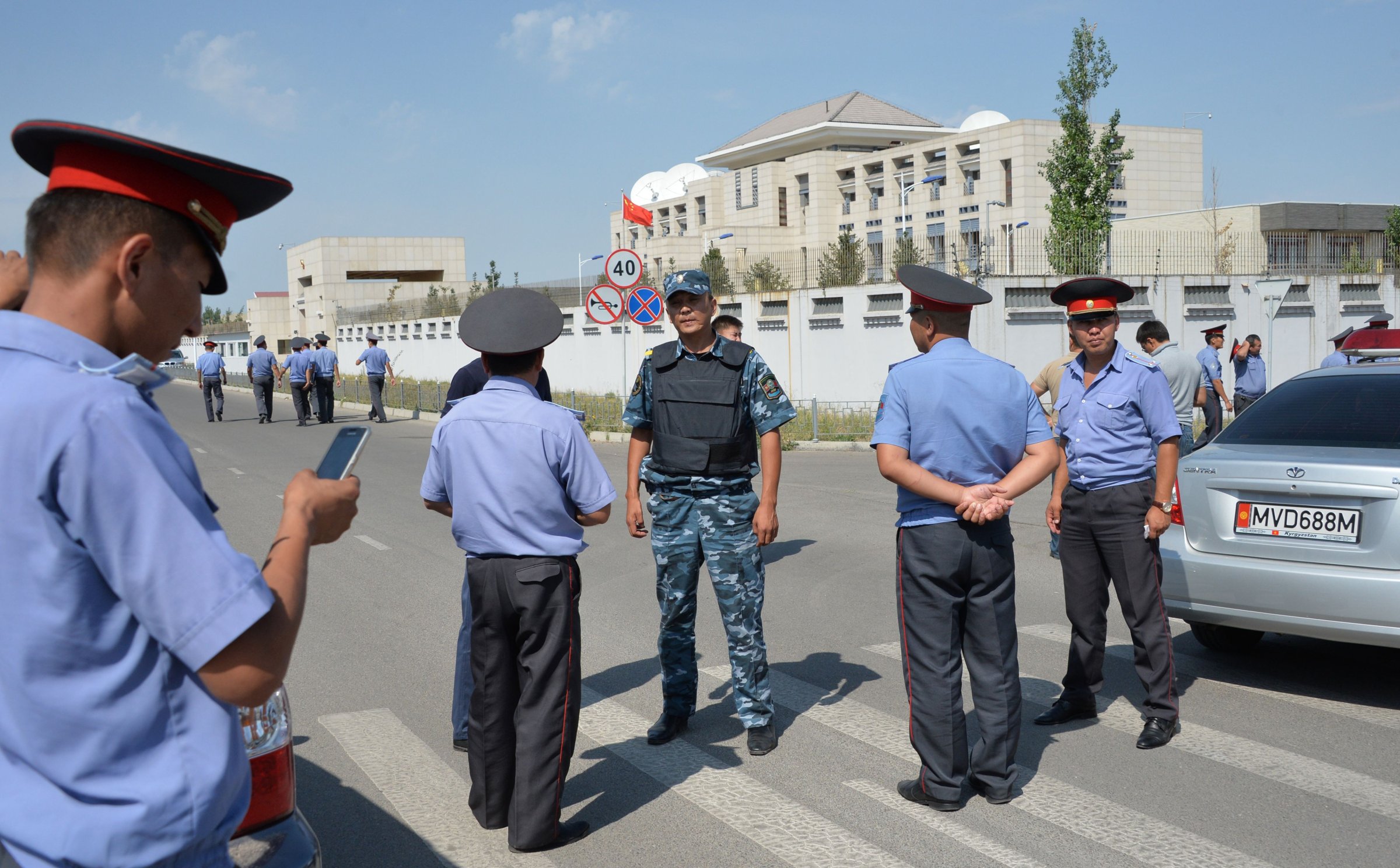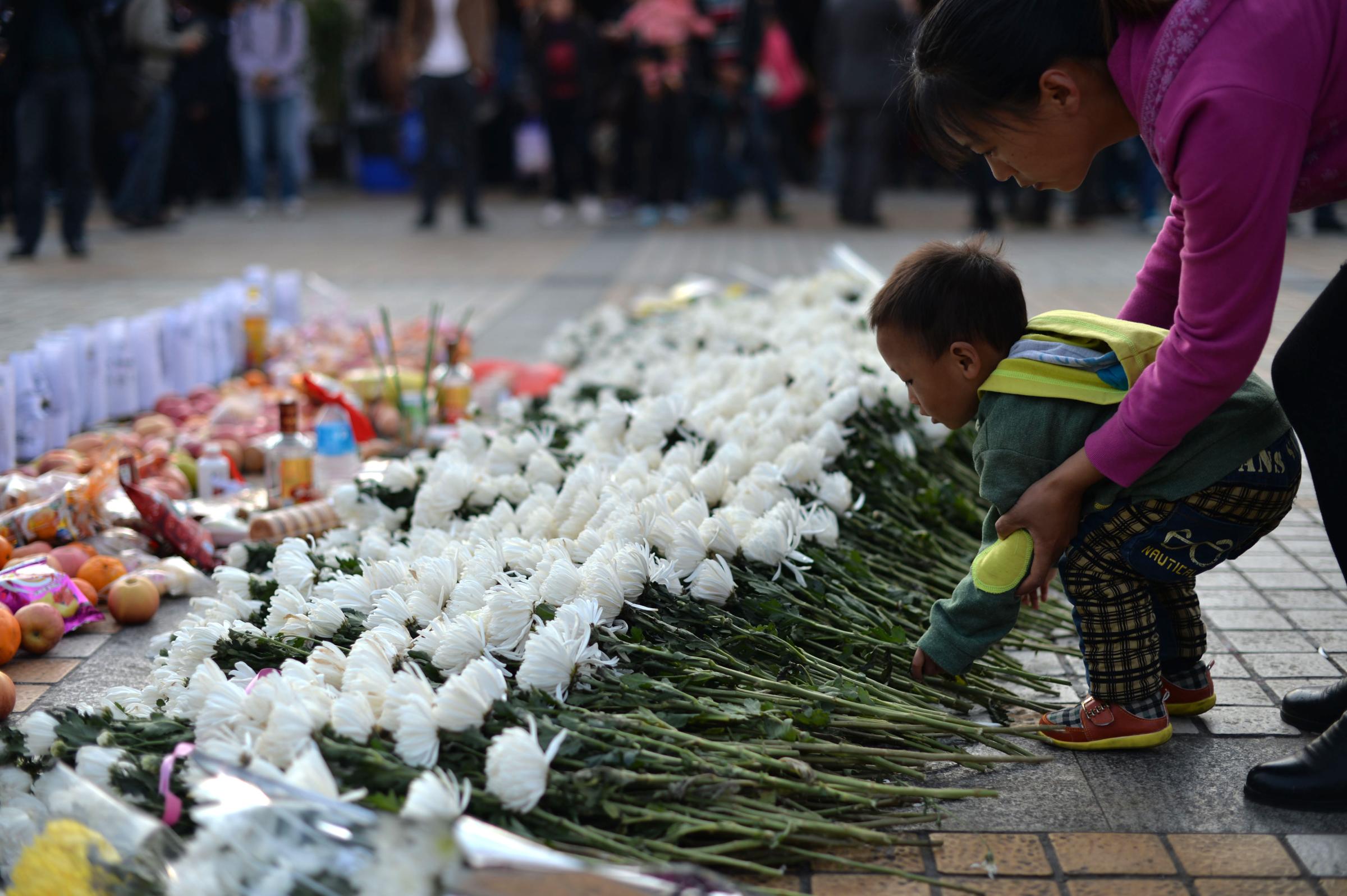
China isn’t immune to global terrorism. That’s one of the troubling lessons of yesterday’s suicide attack on the Chinese embassy in Bishkek, the capital of Kyrgyzstan. The driver of the car managed to only kill himself but he wounded five embassy employees after storming through the diplomatic mission’s gates. And by detonating his deadly charge, the attacker proved that China cannot avoid the surge in religious and ethnic strife that has roiled international geopolitics.
Echoing media reports in Kyrgyzstan, Li Wei, a terrorism expert at the China Institutes of Contemporary International Relations, which is associated with China’s Ministry of State Security, tells TIME he believes the attack was instigated by a separatist group of ethnic Uighurs, a Turkic Muslim minority native to China’s northwest and other parts of Central Asia. Beijing has previously tied the East Turkestan Islamic Movement (ETIM), also known as the Turkestan Islamic Party, to other deadly assaults in China, claiming the group maintains links to al-Qaeda.
“Terrorist attacks around China have risen in recent years,” Li says, “due to the continuous penetration of Islamic states and organizations from western Asia.” Other security analysts, however, have downplayed ETIM’s ability to organize terrorist plots and instead characterize the violence as disparate outbreaks without a unifying mastermind.
For years, Beijing has placed its foreign policy in a kind of silo, maintaining that it stays out of other nations’ internal affairs and doesn’t attach strings to its foreign aid. The West might meddle with clumsy attempts at regime change, the official Chinese thinking went, but Beijing was savvier and more respectful of other nations’ sovereignty. “The overall safety of Chinese diplomats stationed overseas is better than that of Western personnel,” wrote the Chinese Communist Party–linked Global Times in an Aug. 31 editorial. “This is because China has barely made enemies in the world.”
China attracts nowhere near the vitriol that an interventionist power like the U.S. does. But Beijing’s foreign policy and foreign aid do have profound effects on other nations, from the Southeast Asian countries that rim the contested South China Sea to African nations where controversies over Chinese investment have helped determine elections. And as more and more Chinese globe-trot, they have turned into targets. In some cases, Chinese have been simply been caught in the cross fire. After all, Chinese state-owned companies have dispatched thousands of workers to resource-rich but unstable places like South Sudan and northern Iraq. In 2011, the Chinese navy evacuated some 30,000 Chinese nationals, mostly employed by Chinese state oil firms, who were stranded in strife-ridden Libya. Last year, a bombing at a Mogadishu hotel that housed the Chinese embassy in Somalia claimed the life of a Chinese security guard. One of the three bystanders killed by the 2013 Boston marathon bombings was a Chinese graduate student.
In other cases, Chinese have been attacked because of who they are. In May, a Pakistani separatist group planted a roadside bomb in Karachi, as a Chinese engineer and his driver passed by, injuring both. Pakistani Taliban militants have kidnapped Chinese workers and tourists alike. Pakistani authorities blamed a bomb attack in Quetta, which killed dozens of people at a hospital on Aug. 8, on militants hoping to disrupt a planned trade corridor between Pakistan and China — a project on which Beijing plans to lavish billions of dollars.

In Bangkok last year, 20 people were killed in a pipe-bomb attack that Thai officials have blamed on Uighur perpetrators. The attack occurred at the Erawan Shrine, a popular destination for Chinese tourists, and most of the bombing’s victims were ethnically Chinese. Earlier in 2015, Thailand deported around 100 Uighurs back to China after they had escaped to Thailand with hopes of reaching refuge in Turkey and other nations. Human-rights groups protested the forcible return, claiming that the Uighurs would surely face persecution back home. Amid ethnic unrest in Xinjiang, the region where Uighurs live, local officials have heightened religious and cultural repression. The rights crackdown has fueled further resentment of the Chinese state among Uighurs, many of whom feel more cultural affinity with Central Asia than with faraway Beijing.
The Chinese central government, however, contends the Thailand deportees were not refugees at all but militants intent on joining a global jihadist movement. Uighur militants have launched deadly attacks, both in Xinjiang and other parts of China, sowing terror among the nation’s Han majority. Other Uighurs have joined extremist groups in nations as disparate as Indonesia and Syria. But whether the deportees, many of whom traveled to Thailand with their entire families, were truly radical supporters of ETIM is not known.
After the Thai mass deportation, protesters in Turkey demonstrated in front of the Chinese embassy in Ankara and smashed the windows of Thailand’s honorary consulate in Istanbul. The Uighur cause has catalyzed regional unrest before. In 2002, a Chinese diplomat was shot dead in a car in Bishkek in an incident blamed on Uighur separatists. That killing — along with Tuesday’s suicide bomb attack and a 2014 incident in which Kyrgyz border forces shot dead a group of Uighurs who were trying to sneak into the country from China — raises security concerns for China’s grand plan to forge a trade route across Eurasia. Dubbed One Belt, One Road, the well-funded initiative championed by China’s President Xi Jinping happens to cross some of the world’s most dangerous territory, such as Afghanistan and Pakistan.
“Most countries along the One Belt, One Road initiative have security problems,” says terrorism expert Li. “If we can’t solve the problems, it will influence the promotion of One Belt, One Road. It means the projects will have high risks.”
Beijing will need to get used to such global hazards.
— With reporting by Yang Siqi / Beijing
More Must-Reads From TIME
- The 100 Most Influential People of 2024
- How Far Trump Would Go
- Scenes From Pro-Palestinian Encampments Across U.S. Universities
- Saving Seconds Is Better Than Hours
- Why Your Breakfast Should Start with a Vegetable
- 6 Compliments That Land Every Time
- Welcome to the Golden Age of Ryan Gosling
- Want Weekly Recs on What to Watch, Read, and More? Sign Up for Worth Your Time
Contact us at letters@time.com